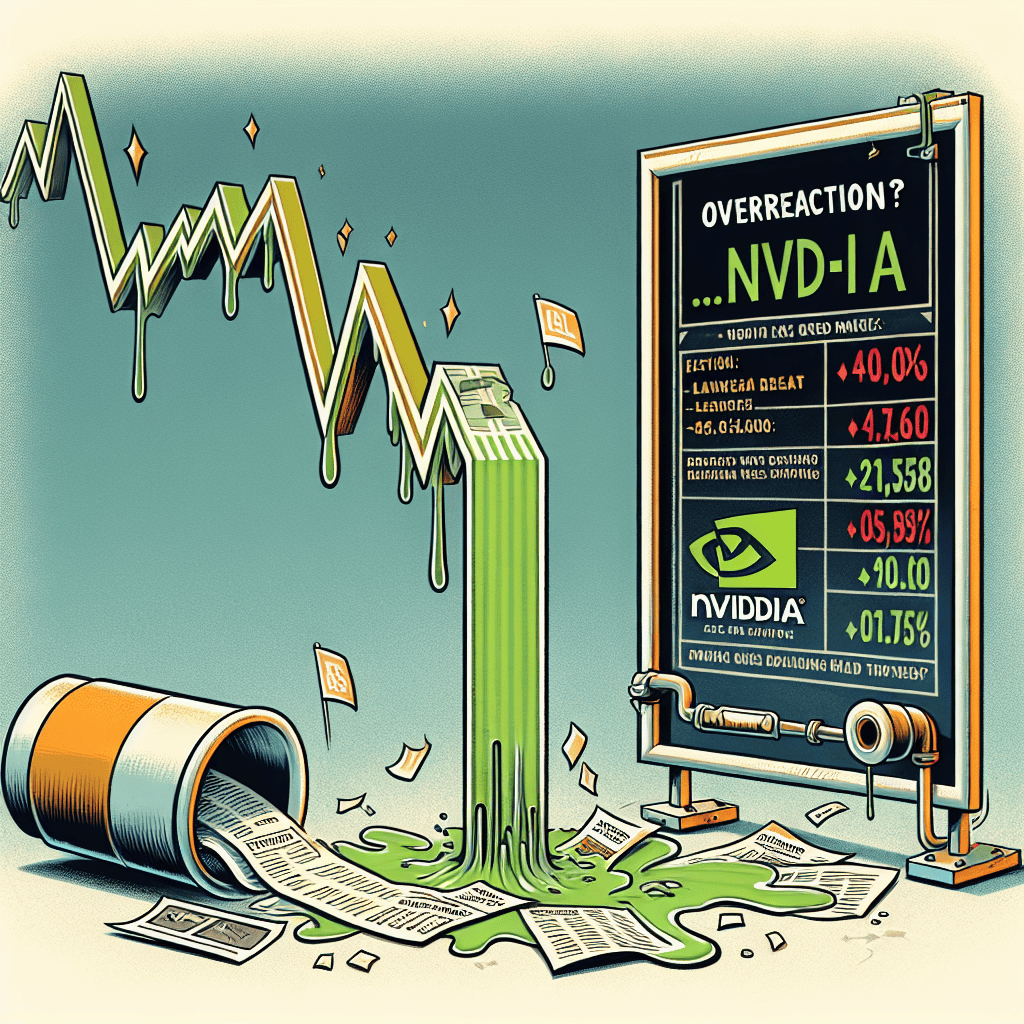“Nvidia’s Dip: A Temporary Blip Amid ASML’s Earnings Slip.”
Introduction
Nvidia’s stock experienced a notable decline following the premature release of ASML’s earnings report, which sent ripples through the semiconductor industry. The unexpected leak led to heightened market volatility, as investors reacted swiftly to the news. However, the subsequent drop in Nvidia’s stock price appears to be an overreaction. Despite the initial shock, Nvidia’s robust fundamentals, strong market position, and continued innovation in the AI and gaming sectors suggest that the company’s long-term growth prospects remain intact. The market’s knee-jerk response overlooks Nvidia’s resilience and potential for recovery, making the dip a potential opportunity for investors with a focus on long-term value.
Impact Of ASML Earnings Leak On Nvidia Stock
The recent decline in Nvidia’s stock following the premature release of ASML’s earnings report has sparked considerable discussion among investors and analysts alike. While the initial reaction to the leak was a drop in Nvidia’s stock price, a closer examination suggests that this response may be an overreaction. To understand the impact of ASML’s earnings on Nvidia, it is essential to consider the broader context of the semiconductor industry and the specific dynamics at play between these two companies.
ASML, a leading supplier of photolithography equipment used in semiconductor manufacturing, plays a crucial role in the supply chain of many tech companies, including Nvidia. The early leak of ASML’s earnings, which revealed results that were below market expectations, understandably caused concern among investors. This is because ASML’s performance is often seen as a bellwether for the semiconductor industry as a whole. However, it is important to note that Nvidia’s business model and market position are distinct from those of ASML, and the two companies face different challenges and opportunities.
Nvidia, known for its graphics processing units (GPUs) and its expanding presence in artificial intelligence (AI) and data centers, has a diversified portfolio that is not solely dependent on the semiconductor manufacturing equipment market. While ASML’s earnings might indicate some short-term headwinds in the semiconductor supply chain, Nvidia’s long-term growth prospects remain robust. The demand for Nvidia’s products continues to be driven by trends such as the increasing adoption of AI technologies, the growth of cloud computing, and the ongoing expansion of the gaming industry.
Moreover, Nvidia has demonstrated resilience and adaptability in navigating supply chain disruptions in the past. The company has consistently invested in research and development to innovate and maintain its competitive edge. This strategic focus on innovation positions Nvidia well to capitalize on emerging opportunities, even in the face of potential industry-wide challenges highlighted by ASML’s earnings.
Furthermore, it is crucial to consider the broader market sentiment and macroeconomic factors that may have contributed to the initial drop in Nvidia’s stock price. Market volatility, driven by geopolitical tensions, inflation concerns, and interest rate fluctuations, can amplify reactions to company-specific news. In such an environment, investors may be more prone to react swiftly to any perceived negative news, even if the long-term fundamentals of a company like Nvidia remain strong.
In light of these considerations, the decline in Nvidia’s stock following ASML’s earnings leak appears to be an overreaction. While it is natural for investors to be cautious in response to unexpected news, it is equally important to assess the specific circumstances and underlying strengths of the companies involved. Nvidia’s strategic positioning, coupled with its track record of innovation and adaptability, suggests that the company is well-equipped to navigate any short-term challenges and continue its growth trajectory.
In conclusion, while the early release of ASML’s earnings report may have initially spooked investors, a more nuanced analysis reveals that Nvidia’s long-term prospects remain intact. The company’s diversified portfolio, focus on innovation, and ability to adapt to changing market conditions position it favorably for future success. As such, the recent drop in Nvidia’s stock should be viewed as an overreaction rather than a reflection of any fundamental weakness in the company’s business model or market position.
Analyzing The Overreaction To Nvidia’s Stock Drop
Nvidia’s stock recently experienced a notable decline following an unexpected early leak of ASML’s earnings report. This event has sparked considerable discussion among investors and analysts, with many questioning whether the market’s reaction was justified. To understand the dynamics at play, it is essential to delve into the factors contributing to this perceived overreaction and assess the broader implications for Nvidia’s stock performance.
Initially, it is important to recognize the interconnectedness of the semiconductor industry, where companies like Nvidia and ASML play pivotal roles. ASML, a leading supplier of photolithography equipment used in semiconductor manufacturing, is often seen as a bellwether for the sector. Consequently, any news regarding ASML can have ripple effects across the industry, influencing investor sentiment towards related companies, including Nvidia. The early leak of ASML’s earnings, which revealed results that fell short of market expectations, understandably triggered concerns about the health of the semiconductor market as a whole.
However, it is crucial to consider Nvidia’s unique position within the industry. Nvidia has established itself as a leader in graphics processing units (GPUs) and artificial intelligence (AI) technologies, with a strong track record of innovation and growth. The company’s robust product pipeline and strategic partnerships have consistently driven its success, setting it apart from other players in the semiconductor space. Therefore, while ASML’s earnings may provide some insight into broader industry trends, they do not necessarily reflect Nvidia’s individual performance or prospects.
Moreover, the market’s reaction to the earnings leak may have been exacerbated by heightened volatility and sensitivity to news in the current economic climate. Investors are navigating a landscape marked by inflationary pressures, geopolitical tensions, and supply chain disruptions, all of which contribute to increased market uncertainty. In such an environment, even minor developments can lead to disproportionate market responses, as investors seek to quickly adjust their portfolios in anticipation of potential risks.
In light of these considerations, it becomes apparent that the drop in Nvidia’s stock may indeed be an overreaction. The company’s fundamentals remain strong, with continued demand for its products across various sectors, including gaming, data centers, and autonomous vehicles. Nvidia’s strategic initiatives, such as its focus on AI and machine learning, position it well for future growth, irrespective of short-term fluctuations in the semiconductor market.
Furthermore, it is worth noting that market corrections are not uncommon and can present opportunities for investors to reassess and capitalize on undervalued stocks. For those with a long-term perspective, Nvidia’s recent dip may offer a chance to invest in a company with a proven track record and promising outlook. As the market digests the implications of ASML’s earnings and refocuses on Nvidia’s intrinsic strengths, it is likely that the stock will recover and continue its upward trajectory.
In conclusion, while the early leak of ASML’s earnings report undoubtedly influenced Nvidia’s stock performance, the subsequent decline appears to be an overreaction when considering the company’s strong fundamentals and growth potential. By maintaining a focus on Nvidia’s unique position within the semiconductor industry and its strategic initiatives, investors can better navigate the current market volatility and make informed decisions about their portfolios. As the dust settles, Nvidia’s resilience and innovation are likely to reaffirm its status as a leader in the technology sector.
Nvidia’s Market Position Despite Stock Volatility
Nvidia, a leading player in the semiconductor industry, recently experienced a notable dip in its stock value following an unexpected early leak of ASML’s earnings report. This incident has sparked discussions among investors and analysts, with many questioning whether the market’s reaction was justified. However, a closer examination of Nvidia’s market position reveals that the drop in stock price may indeed be an overreaction, given the company’s robust fundamentals and strategic positioning within the industry.
To begin with, Nvidia has consistently demonstrated its prowess in the semiconductor sector, particularly in the realm of graphics processing units (GPUs). The company’s GPUs are not only integral to gaming but also play a crucial role in data centers, artificial intelligence, and machine learning applications. This diversification across multiple high-growth areas provides Nvidia with a solid foundation, allowing it to weather short-term market fluctuations more effectively than companies with a narrower focus.
Moreover, Nvidia’s strategic initiatives further bolster its market position. The company’s acquisition of Arm Holdings, although facing regulatory hurdles, is poised to significantly enhance its capabilities in the CPU market. This move is expected to create synergies that will drive innovation and expand Nvidia’s reach into new markets. Additionally, Nvidia’s continuous investment in research and development ensures that it remains at the forefront of technological advancements, maintaining its competitive edge in an ever-evolving industry.
In contrast, the early leak of ASML’s earnings, which triggered the recent stock volatility, should be viewed in context. ASML, a key supplier of photolithography equipment used in semiconductor manufacturing, reported results that were below market expectations. While this news may have raised concerns about the broader semiconductor supply chain, it is important to recognize that Nvidia’s business model is not directly dependent on ASML’s performance. Nvidia’s ability to source components from a diverse range of suppliers mitigates the impact of any single supplier’s performance on its overall operations.
Furthermore, the semiconductor industry as a whole is experiencing a period of rapid growth, driven by increasing demand for advanced technologies such as 5G, autonomous vehicles, and the Internet of Things (IoT). Nvidia is well-positioned to capitalize on these trends, given its strong product portfolio and strategic partnerships. The company’s recent collaborations with major players in the automotive and telecommunications sectors underscore its commitment to expanding its influence across various industries.
In light of these factors, the recent decline in Nvidia’s stock price appears to be more of a knee-jerk reaction rather than a reflection of the company’s intrinsic value. Investors should consider the broader context and Nvidia’s long-term growth prospects before making hasty decisions based on short-term market movements. While stock volatility is an inherent aspect of investing, Nvidia’s solid market position and strategic initiatives suggest that it remains a formidable player in the semiconductor industry.
In conclusion, while the early leak of ASML’s earnings may have temporarily impacted Nvidia’s stock price, the company’s strong fundamentals and strategic direction indicate that the drop is likely an overreaction. As Nvidia continues to innovate and expand its presence across multiple high-growth sectors, it is well-equipped to navigate the challenges and opportunities that lie ahead, reaffirming its status as a leader in the semiconductor industry.
Investor Sentiment And Nvidia’s Future Prospects

Investor sentiment can be a volatile force, often swaying with the winds of market rumors and unexpected news. Recently, Nvidia’s stock experienced a notable decline following an early leak of ASML’s earnings report. This incident has sparked discussions among investors and analysts alike, questioning whether the drop in Nvidia’s stock is justified or merely an overreaction. To understand the situation, it is essential to delve into the factors influencing investor sentiment and Nvidia’s future prospects.
The leak of ASML’s earnings report, which occurred ahead of its scheduled release, revealed results that were less than stellar. ASML, a key supplier of semiconductor manufacturing equipment, plays a crucial role in the broader tech ecosystem. Consequently, any negative news from ASML can ripple through the industry, affecting companies like Nvidia that rely on advanced semiconductor technology. Investors, already on edge due to the leak, reacted swiftly, leading to a sell-off in Nvidia’s stock. However, it is important to consider whether this reaction was proportionate to the actual impact on Nvidia’s business.
Nvidia, a leader in graphics processing units (GPUs) and artificial intelligence (AI) technology, has consistently demonstrated resilience and innovation. The company’s strong fundamentals and strategic positioning in high-growth markets suggest that the recent stock drop may not accurately reflect its long-term potential. While ASML’s earnings report may have raised concerns about the semiconductor supply chain, Nvidia’s diverse product portfolio and robust demand for its GPUs in gaming, data centers, and AI applications provide a solid foundation for future growth.
Moreover, Nvidia’s recent strategic moves further bolster its prospects. The company’s acquisition of Arm Holdings, a leading semiconductor design firm, is poised to enhance its capabilities and expand its reach into new markets. This acquisition, pending regulatory approval, is expected to create synergies that could drive innovation and revenue growth. Additionally, Nvidia’s continued investment in research and development underscores its commitment to staying at the forefront of technological advancements.
In light of these factors, the market’s reaction to the ASML earnings leak appears to be an overreaction. While short-term fluctuations in stock prices are not uncommon, they often do not reflect the underlying strength and potential of a company. Investors should consider the broader context and Nvidia’s strategic initiatives when evaluating its future prospects. The company’s ability to adapt to changing market dynamics and capitalize on emerging opportunities positions it well for sustained success.
Furthermore, it is crucial to recognize that the semiconductor industry is inherently cyclical, with periods of supply constraints and demand fluctuations. Nvidia has navigated these cycles in the past and emerged stronger, thanks to its innovative products and strategic partnerships. As the industry continues to evolve, Nvidia’s focus on AI, machine learning, and other cutting-edge technologies will likely drive its growth and solidify its position as a market leader.
In conclusion, while the early leak of ASML’s earnings report may have triggered a temporary decline in Nvidia’s stock, it is essential to view this event in the context of the company’s long-term potential. Nvidia’s strong fundamentals, strategic acquisitions, and commitment to innovation suggest that the recent drop in stock price is an overreaction. Investors should remain focused on the company’s future prospects and its ability to navigate the challenges and opportunities within the dynamic semiconductor industry.
Comparing Nvidia’s Fundamentals With Market Reactions
Nvidia’s stock recently experienced a notable decline following the premature release of ASML’s earnings report, which sent ripples through the semiconductor industry. This reaction, however, may be an overreaction when considering Nvidia’s robust fundamentals and market position. To understand the dynamics at play, it is essential to compare Nvidia’s intrinsic strengths with the market’s immediate response to external factors.
Nvidia, a leader in the semiconductor industry, has consistently demonstrated strong financial performance and innovation. The company’s dominance in graphics processing units (GPUs) and its strategic expansion into artificial intelligence (AI) and data centers have positioned it as a key player in the tech sector. Nvidia’s revenue growth has been impressive, driven by increasing demand for its products across various sectors, including gaming, professional visualization, and automotive technology. Furthermore, Nvidia’s commitment to research and development ensures that it remains at the forefront of technological advancements, which is crucial in an industry characterized by rapid innovation.
In contrast, the market’s reaction to ASML’s earnings leak appears to be more of a knee-jerk response rather than a reflection of Nvidia’s underlying strengths. ASML, a major supplier of photolithography equipment used in semiconductor manufacturing, plays a critical role in the supply chain. Any news regarding ASML can understandably cause concern among investors, given the interconnected nature of the semiconductor industry. However, it is important to recognize that Nvidia’s business model and revenue streams are not directly tied to ASML’s performance. While ASML’s earnings may provide insights into broader industry trends, they do not necessarily dictate Nvidia’s financial health or growth prospects.
Moreover, Nvidia’s strategic initiatives further underscore its resilience. The company’s foray into AI and machine learning has opened new avenues for growth, with its GPUs being integral to AI workloads. Nvidia’s partnerships with major cloud service providers and its development of AI platforms have solidified its position in this burgeoning market. Additionally, Nvidia’s acquisition of Arm Holdings, although facing regulatory hurdles, signifies its ambition to expand its influence in the semiconductor landscape. These strategic moves highlight Nvidia’s proactive approach to diversifying its portfolio and mitigating risks associated with market fluctuations.
It is also worth noting that market reactions are often influenced by short-term sentiment rather than long-term fundamentals. Investors may react swiftly to news, leading to volatility in stock prices. However, such fluctuations do not necessarily reflect the intrinsic value of a company. Nvidia’s strong balance sheet, consistent revenue growth, and strategic vision provide a solid foundation for sustained success. While external factors can impact stock prices in the short term, Nvidia’s long-term prospects remain promising.
In conclusion, the recent decline in Nvidia’s stock following ASML’s earnings leak appears to be an overreaction when considering Nvidia’s strong fundamentals and strategic initiatives. While the semiconductor industry is indeed interconnected, Nvidia’s business model and growth trajectory are not directly dependent on ASML’s performance. Investors should focus on Nvidia’s intrinsic strengths, including its leadership in GPUs, expansion into AI, and strategic acquisitions, which position it well for future growth. By maintaining a long-term perspective, investors can better appreciate Nvidia’s potential and navigate the market’s short-term fluctuations with confidence.
Long-Term Growth Potential Of Nvidia Amid Short-Term Fluctuations
Nvidia, a leading player in the semiconductor industry, recently experienced a decline in its stock value following an unexpected early leak of earnings from ASML, another major company in the sector. This incident has sparked concern among investors, leading to a sell-off that many analysts believe is an overreaction. While short-term fluctuations in stock prices are not uncommon, it is crucial to consider the long-term growth potential of Nvidia, which remains robust despite the current market volatility.
The leak of ASML’s earnings, which showed results that were below market expectations, sent ripples through the semiconductor industry. Investors, already on edge due to global economic uncertainties, reacted swiftly, leading to a decline in Nvidia’s stock. However, it is important to note that Nvidia’s fundamentals remain strong, and the company’s strategic positioning in key growth areas continues to offer significant potential for future expansion.
Nvidia has consistently demonstrated its ability to innovate and adapt to changing market demands. The company’s leadership in graphics processing units (GPUs) has been a cornerstone of its success, particularly in the gaming industry. However, Nvidia’s influence extends far beyond gaming. The company has made substantial inroads into data centers, artificial intelligence (AI), and autonomous vehicles, all of which are poised for significant growth in the coming years.
The data center segment, in particular, represents a substantial opportunity for Nvidia. As businesses increasingly rely on cloud computing and AI-driven analytics, the demand for high-performance computing solutions is expected to rise. Nvidia’s GPUs are well-suited to meet these needs, offering unparalleled processing power and efficiency. This positions the company to capitalize on the growing trend of digital transformation across various industries.
Moreover, Nvidia’s advancements in AI technology have positioned it as a leader in this rapidly evolving field. The company’s AI platforms are being utilized in a wide range of applications, from healthcare to finance, enabling organizations to harness the power of machine learning and deep learning. As AI continues to permeate different sectors, Nvidia’s expertise and product offerings are likely to drive sustained growth.
In addition to its technological prowess, Nvidia’s strategic acquisitions have further bolstered its long-term prospects. The acquisition of Mellanox Technologies, for instance, has enhanced Nvidia’s capabilities in high-performance computing and networking, providing a competitive edge in the data center market. Such strategic moves underscore Nvidia’s commitment to expanding its footprint and maintaining its leadership position in the industry.
While the recent stock decline may cause concern among some investors, it is essential to view Nvidia’s performance through a long-term lens. The company’s strong financial position, coupled with its focus on innovation and strategic growth initiatives, suggests that it is well-equipped to navigate short-term market fluctuations. Furthermore, the global demand for advanced computing solutions is expected to continue its upward trajectory, providing a favorable environment for Nvidia’s sustained growth.
In conclusion, while the early leak of ASML’s earnings has temporarily impacted Nvidia’s stock, the drop appears to be an overreaction when considering the company’s long-term growth potential. Nvidia’s leadership in key technological areas, combined with its strategic initiatives and robust financial health, positions it well for future success. Investors would do well to focus on these enduring strengths rather than be swayed by short-term market movements.
Lessons From Nvidia’s Stock Reaction To ASML’s Earnings Leak
Nvidia’s stock experienced a notable decline following the premature release of ASML’s earnings, a development that has sparked considerable discussion among investors and analysts. This reaction, however, may be an overreaction, as the underlying fundamentals of Nvidia remain robust. To understand why the market’s response might be disproportionate, it is essential to examine the context of the situation and the broader implications for Nvidia.
ASML, a key supplier in the semiconductor industry, plays a crucial role in the production of advanced chips. Its earnings reports are closely watched as indicators of the health of the semiconductor supply chain. When ASML’s earnings were inadvertently leaked, revealing results that fell short of market expectations, it triggered a ripple effect across the industry. Nvidia, being a major player in the semiconductor space, was not immune to this impact. Investors, concerned about potential supply chain disruptions and their effects on Nvidia’s production capabilities, reacted swiftly, leading to a drop in Nvidia’s stock price.
However, it is important to consider that Nvidia’s business model and market position are not solely dependent on ASML’s performance. While ASML’s technology is integral to the production of cutting-edge chips, Nvidia has consistently demonstrated its ability to innovate and adapt to changing market conditions. The company’s strong focus on artificial intelligence, gaming, and data centers has positioned it as a leader in these high-growth areas. Consequently, short-term fluctuations in ASML’s earnings should not overshadow Nvidia’s long-term growth prospects.
Moreover, Nvidia’s recent financial performance has been impressive, with the company reporting record revenues and profits in its latest quarterly results. This success is driven by robust demand for its graphics processing units (GPUs) and data center products, which continue to gain traction across various industries. The increasing adoption of AI technologies and the expansion of cloud computing further bolster Nvidia’s growth trajectory. Therefore, while the market’s immediate reaction to ASML’s earnings leak may have been negative, it does not necessarily reflect Nvidia’s intrinsic value or future potential.
In addition to Nvidia’s strong fundamentals, it is crucial to recognize the broader market dynamics at play. The semiconductor industry is characterized by cyclical trends, with periods of high demand often followed by supply constraints. Investors should be mindful of these cycles and avoid making hasty decisions based on short-term market movements. Instead, a more measured approach that considers the long-term growth drivers and competitive advantages of companies like Nvidia is warranted.
Furthermore, the market’s reaction to ASML’s earnings leak underscores the importance of maintaining a diversified investment portfolio. By spreading investments across different sectors and asset classes, investors can mitigate the impact of unexpected events and reduce overall portfolio risk. This strategy is particularly relevant in the volatile technology sector, where rapid advancements and unforeseen challenges can lead to significant price swings.
In conclusion, while Nvidia’s stock decline following ASML’s earnings leak may have caused concern among investors, it is essential to view this reaction in the context of Nvidia’s strong fundamentals and long-term growth prospects. The company’s leadership in AI, gaming, and data centers, coupled with its ability to navigate industry cycles, positions it well for future success. By maintaining a focus on the bigger picture and adopting a diversified investment approach, investors can better navigate the complexities of the semiconductor market and capitalize on opportunities for growth.
Q&A
1. **What caused Nvidia’s stock to fall?**
Nvidia’s stock fell due to an early leak of ASML’s earnings, which raised concerns about the semiconductor industry’s outlook.
2. **What was the content of the ASML earnings leak?**
The leak suggested weaker-than-expected demand and potential challenges in the semiconductor sector, impacting investor sentiment.
3. **Why is the drop in Nvidia’s stock considered an overreaction?**
Analysts believe the drop is an overreaction because Nvidia’s fundamentals remain strong, and the company is well-positioned in the AI and data center markets.
4. **How did the market react to the ASML earnings leak?**
The market reacted negatively, with semiconductor stocks, including Nvidia, experiencing a decline due to fears of a broader industry slowdown.
5. **What are Nvidia’s strengths that might mitigate the impact of the ASML news?**
Nvidia’s strengths include its leadership in AI technology, robust demand for its GPUs, and strong growth prospects in data centers and gaming.
6. **What is the general sentiment among analysts regarding Nvidia’s future?**
Analysts generally remain optimistic about Nvidia’s future, citing its innovative products and strategic positioning in high-growth markets.
7. **What should investors consider in light of the stock drop?**
Investors should consider Nvidia’s long-term growth potential and market leadership, rather than short-term market reactions to industry news.
Conclusion
Nvidia’s stock decline following the early leak of ASML’s earnings appears to be an overreaction due to several factors. Firstly, Nvidia’s core business and growth prospects remain strong, driven by its leadership in AI and data center markets. The market’s reaction may have been influenced by broader concerns about the semiconductor industry, but Nvidia’s fundamentals and strategic positioning are largely unaffected by ASML’s specific earnings results. Additionally, Nvidia’s robust financial performance, ongoing innovation, and strategic partnerships continue to support its long-term growth trajectory. Therefore, the stock drop seems more reflective of short-term market volatility rather than any significant change in Nvidia’s intrinsic value or future potential.




